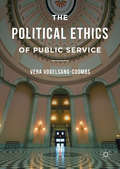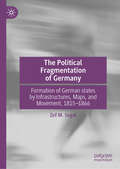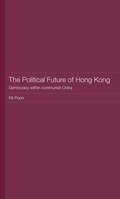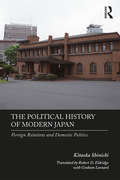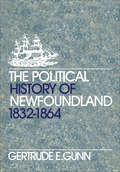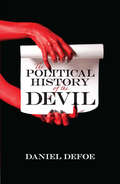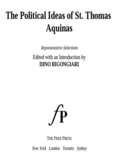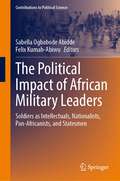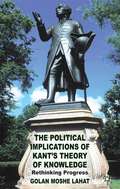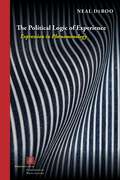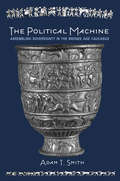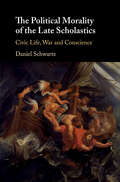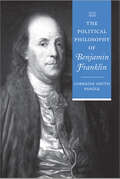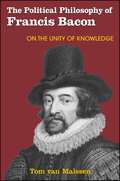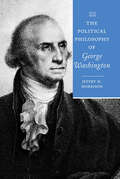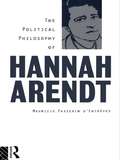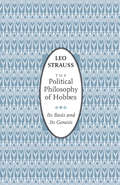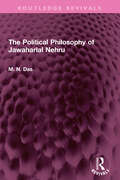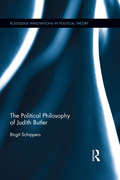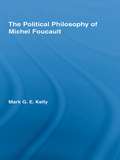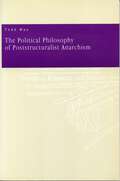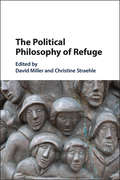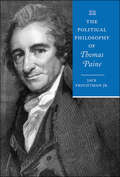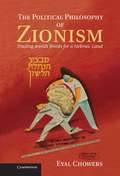- Table View
- List View
The Political Ethics of Public Service
by Vera Vogelsang-CoombsThis book provides a defense of democratic politics in American public service and offers the political ethics of public service as a realistic and optimistic alternative to the cynical American view toward politics and public service. The author's alternative helps career public servants regain public trust by exercising constitutionally centered moral and political leadership that balances the regime values of liberty and equality in governing American society while contributing to the ethical progress of the nation. She identifies three distinct leadership styles of political ethics, enabling career public servants to reconcile their personal loyalties, morality, and consciences with the public and private morality of American society and their constitutional obligations to secure the democratic freedoms of Americans. Recognizing career public servants' moral and institutional struggles, the book proposes a rigorous leadership development program to acclimate individuals to workplace psychological, moral, and political challenges. The view offered here is that career public servants must be a part of, rather than isolated from, American politics to be effective on the job.
The Political Fragmentation of Germany: Formation of German states by Infrastructures, Maps, and Movement, 1815–1866
by Zef M. SegalThis book analyses the development of German territorial states in the nineteenth century through the prism of five Mittelstaaten: Bavaria, Saxony, Hanover, Württemberg, and Baden. It asks how a state becomes a place, and argues that it involves a contested and multi-faceted process, one of slow and uneven progress. The study approaches this question from a new and crucial angle, that of spatiality and public mobility. The issues covered range from the geography of state apparatus, the aesthetics of German cartography and the trajectories of public movement. Challenging the belief that territorial delimitation is primarily a matter of policy and diplomacy, this book reveals that political territories are constructed through daily practices and imagination.
The Political Future of Hong Kong: Democracy within communist China (Routledge Studies on the Chinese Economy)
by Kit PoonOn July 1st, 2007, Hong Kong celebrated the 10th anniversary of its return to the People’s Republic of China, but the past decade has been a bumpy ride for both the Hong Kong people and the central leaders in China. In fact, in 2003 Beijing had already succumbed to public pressure within the fairly short period of its rule by abruptly replacing its handpicked first Chief Executive with a British-groomed civil servant. This book examines the origin and evolution of Hong Kong’s political system, analyses the current contradictions in the system, and discusses how the system might develop in future. It focuses in particular on the office of Chief Executive in the context of Hong Kong’s transformation from a British colony to a Special Administrative Region in China. The dualistic structure of the Chief Executive’s office embodies a dilemma between two competing imperatives – Communist China’s imperative to retain a colonial political system where executive power is concentrated at the top; alongside the need to accommodate new, increasing demands for democratic representation within the territory. The Political Future of Hong Kong demonstrates how the British legacy left its imprint on Hong Kong’s political system. It analyses the strategies adopted by the Sovereign state as it attempted to cope with demands for representative government in the post-handover years, and the strains placed on Hong Kong’s political institutions by the uneasy relationship between central government and local forces of liberal autonomy. Kit Poon examines the possibility of the introduction of universal suffrage for the selection of the Chief Executive, and considers how Hong Kong can secure a democratic future in the context of broader Beijing-Hong Kong relations.
The Political History of Modern Japan: Foreign Relations and Domestic Politics
by Kitaoka ShinichiSpanning the 130-year period between the end of the Tokugawa Era and the end of the Cold War, this book introduces students to the formation, collapse, and rebirth of the modern Japanese state. It demonstrates how, faced with foreign threats, Japan developed a new governing structure to deal with these challenges and in turn gradually shaped its international environment. Had Japan been a self-sufficient power, like the United States, it is unlikely that external relations would have exercised such great control over the nation. And, if it were a smaller country, it may have been completely pressured from the outside and could not have influenced the global stage on its own. For better or worse therefore, this book argues, Japan was neither too large nor too small. Covering the major events, actors, and institutions of Japan’s modern history, the key themes discussed include: Building the Meiji state and Constitution. The establishment of Parliament. The First Sino-Japanese and Russo-Japanese Wars. Party Politics and International Cooperation. The Pacific War. Development of LDP politics. Changes in the international order and the end of the Cold War. This book, written by one of Japan's leading experts on Japan's political history, will be an essential resource for students of Japanese modern history and politics.
The Political History of Newfoundland, 1832-1864
by Gertrude E. GunnThree decades of disorder followed the establishment of representative government in Newfoundland in 1832. The pressures and processes during these years have given Newfoundland a political history peculiarly its own. This study examines the structure of the early political parties, the causes of popular tumult, and the effects of constitutional change during this colourful and complex period. First published in 1966, this book is still the most comprehensive investigation of a crucial phase in Newfoundland's political development.
The Political History of the Devil: As Well Ancient As Modern; In Two Parts (classic Reprint) (Ams Studies In The Eighteenth Century Ser. #No. 44)
by Daniel DefoeIrreverent and ironic, this 1726 satire by the author of Robinson Crusoe examines the evolution of evil and the rise of the historical force known as "the devil." Daniel Defoe's passionate and perceptive survey starts with Satan's origins, chronicling the devil's presence in the Bible and his growing sway over humanity. An overview of satanic influences on eighteenth-century life follows, focusing on monarchs and tyrants as well as common folk. Defoe supports his arguments not only with extensive quotes from scripture but also with citations from other sources, including Milton's Paradise Lost.Written at the dawn of the Enlightenment, this treatise recaptures a moment in time when widespread certainty of the devil's existence was dwindling. Defoe, a firm believer, posits that the devil reacted to the changing times by shifting his influence from the supernatural realm of witches and wizards to the ordinary world of "beaus, beauties, wits, and fools." This intriguing view of politics and society during the 1700s offers a vivid contemporary portrait of a culture torn between theology and reason.
The Political Ideas of St. Thomas Aquinas
by Thomas AquinasWhat is the relation of the state to God? How can a man be both a "political animal" and a follower of Christ? These enduring questions are considered in detail in this volume of selected writings of St Thomas Aquinas. Among the most influential of the medieval philosophers, he is recognized for synthesizing Christian theology with Artistotelian metaphysics, recognized for synthesizing Christian theology with Artistotelian metaphysics, and providing a philosophical defence of Christianity addressed to the non-Christian reader. This selection specifically focuses on Aquinas's concepts of politics, justice and social conflicts, and the impact they have on society. In a discussion of the historical background and evolution of St Thomas Aquinas's political ideas, the editor explains their enduring influence and legacy. He also provides explanatory notes and a glossary of unusual terms and unfamiliar words.
The Political Impact of African Military Leaders: Soldiers as Intellectuals, Nationalists, Pan-Africanists, and Statesmen (Contributions to Political Science)
by Sabella Ogbobode Abidde Felix Kumah-AbiwuThis edited volume examines the cases of four African military leaders who had enormous impact on the continent and beyond. These military officers, and later heads of state -- Jerry Rawlings of Ghana; Moammar Gaddafi of Libya; Thomas Sankara of Burkina Faso; and Gamal Abdel Nasser of Egypt – were provocative and polarizing figures, beloved domestically but mostly viewed with suspicion and hostility by foreign governments. This volume studies these leaders as a group, engaging in a critical but systematic examination of their personalities, leadership styles, official performance, legacies, and their continuing impact on the future and political destiny of the continent. Providing a survey of controversial but important African political figures, this volume will be of use to scholars and students in the social sciences, especially those interested in African history, African studies, military science, Black studies, political science, leadership studies, and the politics of developing nations.
The Political Implications of Kant’s Theory of Knowledge
by Golan Moshe LahatBased on an insightful and innovative reading of Kant's theory of knowledge, this book explores the political implications of Kant's philosophical writings on knowledge. It suggests that Kant offers a stable foundation for the reconsideration of the idea of progress as crucial in matters of political management at the outset of the 21st Century.
The Political Logic of Experience: Expression in Phenomenology (Perspectives in Continental Philosophy)
by Neal DeRooThe Political Logic of Experience argues that experience and phenomenology are essentially political, with profound implications for our understanding of subjectivity, epistemology, experience, the phenomenological method, and politics. Drawing on work from across the phenomenological tradition, it develops an account of expression as the internal relationship uniting knowing, being, and doing with both transcendental conditions and empirical phenomena. This expressive unification generates subjectivity as an expression of particular communities and subjects as an expression of subjectivity. Subjectivity and experience are therefore both revealed to be inherently political prior to their expression in particular subjects.In clarifying the political nature of experience and the constitution of subjectivity, the book puts the work of critical phenomenology in dialogue with transcendental phenomenology to reveal the need for a phenomenological politics: a field tasked with explaining the expressive, co-constitutive, and necessarily political relationships between subjects and their communities. It is only through such a phenomenological politics that we can properly make sense of the epistemological, ontological, and practical significance of issues like racism and sexism, problems that concern our very experience of the world. The book reveals phenomenology to be both essentially political and politically essential, as it emerges within particular communities and shapes and transforms how individuals within those communities experience the world.Touching on issues of transcendental phenomenology, political strategy, historical interpretation and inter-disciplinary phenomenological method, the book argues for foundational claims pertaining to phenomenology, politics, and social criticism that will be of interest to those working in philosophy, gender studies, race, queer theory, transcendental and applied phenomenology, and beyond.
The Political Machine: Assembling Sovereignty in the Bronze Age Caucasus
by Adam T. SmithThe Political Machine investigates the essential role that material culture plays in the practices and maintenance of political sovereignty. Through an archaeological exploration of the Bronze Age Caucasus, Adam Smith demonstrates that beyond assemblies of people, polities are just as importantly assemblages of things--from ballots and bullets to crowns, regalia, and licenses. Smith looks at the ways that these assemblages help to forge cohesive publics, separate sovereigns from a wider social mass, and formalize governance--and he considers how these developments continue to shape politics today.Smith shows that the formation of polities is as much about the process of manufacturing assemblages as it is about disciplining subjects, and that these material objects or "machines" sustain communities, orders, and institutions. The sensibilities, senses, and sentiments connecting people to things enabled political authority during the Bronze Age and fortify political power even in the contemporary world. Smith provides a detailed account of the transformation of communities in the Caucasus, from small-scale early Bronze Age villages committed to egalitarianism, to Late Bronze Age polities predicated on radical inequality, organized violence, and a centralized apparatus of rule. From Bronze Age traditions of mortuary ritual and divination to current controversies over flag pins and Predator drones, The Political Machine sheds new light on how material goods authorize and defend political order.
The Political Morality of the Late Scholastics: Civic Life, War and Conscience
by Daniel SchwartzThe late scholastics, writing in the Baroque and Early Modern periods, discussed a wide variety of moral questions relating to political life in times of both peace and war. Is it ever permissible to bribe voters? Can tax evasion be morally justified? What are the moral duties of artists? Is it acceptable to fight in a war one believes to be unjust? May we surrender innocents to the enemy if it is necessary to save the state? These questions are no less relevant for philosophers and politicians today than they were for late scholastic thinkers. By bringing into play the opinions and arguments of numerous authors, many of them little known or entirely forgotten, this book is the first to provide an in-depth treatment of the dynamic and controversial nature of late scholastic applied moral thinking which demonstrates its richness and diversity.
The Political Philosophy of Benjamin Franklin (The Political Philosophy of the American Founders)
by Lorraine Smith Pangle“One of the very finest introductions to this remarkable American’s thought.” —Ralph Ketcham, Claremont Review of BooksHe invented the wood-burning stove and the lightning rod, he wrote Poor Richard’s Almanac and The Way to Wealth, and he traveled the world as a diplomat. But it was in politics that Benjamin Franklin made his greatest impact.Franklin’s political writings are full of fascinating reflections on human nature, on the character of good leadership, and on why government is such a messy and problematic business. Drawing together threads in Franklin’s writings, Lorraine Smith Pangle illuminates his thoughts on citizenship, federalism, constitutional government, the role of civil associations, and religious freedom.Of the American Founders, Franklin had an unrivaled understanding of the individual human soul. At the heart of his political vision is a view of democratic citizenship, a rich understanding of the qualities of the heart and mind necessary to support liberty and sustain happiness. This concise introduction reflects Franklin’s valuable insight into political issues that continue to be relevant today.
The Political Philosophy of Francis Bacon: On the Unity of Knowledge
by Tom van MalssenComprehensive in its ambitions and meticulous in its approach, The Political Philosophy of Francis Bacon is a new and unique interpretation of one of early modernity's more important thinkers. Whereas recent works on Bacon tend to confine themselves either to interpreting his historical context or to considering the founder of Baconianism from the perspective of one work in particular or the history of science in general, Tom van Malssen argues, through detailed and provocative interpretations of a number of Baconian writings, that the unity of Bacon's thought can only be revealed if these writings are read in historical and philosophical conjunction as well as on the assumption that they are all somehow part of the whole of Bacon's political philosophy. In addition to restoring Bacon to the pantheon of great philosophers, Van Malssen demonstrates that a proper understanding of Bacon's political philosophy contributes significantly to our understanding of the nature of philanthropic science, the modern project, and ultimately ourselves.
The Political Philosophy of George Washington (The Political Philosophy of the American Founders)
by Jeffry H. Morrison&“A delight . . . rewarding insight into Washington and his times . . . and an illuminating section on the religious outlook of this American founder.&” —Journal of American History George Washington is revered as the father of his country, a clever and skilled general, and a man of restrained principle—but not as a political thinker. This short introduction to Washington&’s political philosophy reveals him as a thoughtful public intellectual who was well equipped to lead the young United States. Though Washington left little explicit writing on political philosophy, Jeffry Morrison examines his key writings, actions, education, and political and professional lives. He finds that Washington held closely to a trinity of foundational principles—classical republicanism, British liberalism, and Protestant Christianity—with greater fidelity than many of the other founding fathers. In unearthing Washington&’s ideological growth, Morrison reveals the intellectual heritage of his political thought and shows how these beliefs motivated him to action. This insightful, concise story makes clearer the complexities of the revolutionary era and shows how the first president&’s political ideas shaped governmental institutions and instantiated the nation&’s foundational principles. &“Those who accept the &‘dumb general&’ caricature should be chastened by Morrison&’s elegant and concise sampling of Washington&’s writings . . . This work deserves to be studied and debated by political scientists, historians, and public intellectuals concerned with America&’s fundamental political principles and those of liberal democracy.&” —Review of Politics
The Political Philosophy of Hannah Arendt
by Maurizio Passerin d'EntrèvesFirst published in 1993. Routledge is an imprint of Taylor & Francis, an informa company.
The Political Philosophy of Hobbes
by Leo Strauss Elsa M. SinclairIn this classic analysis, Leo Strauss pinpoints what is original and innovative in the political philosophy of Thomas Hobbes. He argues that Hobbes's ideas arose not from tradition or science but from his own deep knowledge and experience of human nature. Tracing the development of Hobbes's moral doctrine from his early writings to his major work The Leviathan, Strauss explains contradictions in the body of Hobbes's work and discovers startling connections between Hobbes and the thought of Plato, Thucydides, Aristotle, Descartes, Spinoza, and Hegel.
The Political Philosophy of Hobbes: Its Basis and Its Genesis
by Leo StraussIn this classic analysis, Leo Strauss pinpoints what is original and innovative in the political philosophy of Thomas Hobbes. He argues that Hobbes's ideas arose not from tradition or science but from his own deep knowledge and experience of human nature. Tracing the development of Hobbes's moral doctrine from his early writings to his major work The Leviathan, Strauss explains contradictions in the body of Hobbes's work and discovers startling connections between Hobbes and the thought of Plato, Thucydides, Aristotle, Descartes, Spinoza, and Hegel.
The Political Philosophy of Jawaharlal Nehru (Routledge Revivals)
by M.N. DasFirst published in 1961, The Political Philosophy of Jawaharlal Nehru is an attempt to coordinate Jawaharlal Nehru’s ideas which, in essence, reflect his political philosophy. Nehru distinguished himself as a philosopher-politician, thinking somewhat as a philosopher while working as a politician, steering his political ideas between idealism and realism. In an eventful life, his had been the many-sided role of a revolutionary and a nationalist, a democrat and a socialist, an internationalist and a pacifist, a head of the government and, above all, a lone individual and thinker. Nehru preserved his individuality through all external influences, including those of Gandhi and Marx, and it is this which remains the keynote of his thought. It has been the aim of the author to present in an objective way the ideas of the man in the light of his own words as available from a wide range of material. This book will be of interest to students of history, political science, and philosophy.
The Political Philosophy of Judith Butler (Routledge Innovations in Political Theory)
by Birgit SchippersJudith Butler can justifiably be described as one of the major critical thinkers of our time. While she is best-known for her interventions into feminist debates on gender, sexuality and feminist politics, her focus in recent years has broadened to encompass some of the most pertinent topics of interest to contemporary political philosophy. Drawing on Butler’s deconstructive reading of the key categories and concepts of political thought, Birgit Schippers expounds and advocates her challenge to the conceptual binaries that pervade modern political discourse. Using examples and case studies like the West’s intervention in Iraq and Afghanistan, and in relation to the Israeli-Palestinian conflict, Schippers demonstrates how Butler’s philosophically informed engagement with pressing political issues of our time elucidates our understanding of topics such as immigration and multiculturalism, sovereignty, or the prospect for new forms of cohabitation and citizenship beyond and across national boundaries. A detailed exposition and analysis of Butler’s recent ideas, championing her efforts at articulating the possibilities for radical politics and ethical life in an era of global interdependence, this book makes an makes an important contribution to the emerging field of international political philosophy.
The Political Philosophy of Michel Foucault (Routledge Studies in Social and Political Thought #Vol. 61)
by Mark G.E. KellyThis book is the first to systematically reconstruct Michel Foucault’s political and philosophical thought across his career. It argues, in the areas of epistemology, power, subjectivity, resistance, politics, and ethics, that Foucault’s work represents the articulation of a consistent and progressive philosophical and political viewpoint. The work is thus an important intervention into the field of Foucault studies, where many continue to claim that Foucault’s work is contradictory, nonsensical, or nihilistic.
The Political Philosophy of Poststructuralist Anarchism
by Todd MayThe political writings of the French poststructuralists have eluded articulation in the broader framework of general political philosophy primarily because of the pervasive tendency to define politics along a single parameter: the balance between state power and individual rights in liberalism and the focus on economic justice as a goal in Marxism. What poststructuralists like Michel Foucault, Gilles Deleuze, and Jean-François Lyotard offer instead is a political philosophy that can be called tactical: it emphasizes that power emerges from many different sources and operates along many different registers. This approach has roots in traditional anarchist thought, which sees the social and political field as a network of intertwined practices with overlapping political effects. The poststructuralist approach, however, eschews two questionable assumptions of anarchism, that human beings have an (essentially benign) essence and that power is always repressive, never productive.After positioning poststructuralist political thought against the background of Marxism and the traditional anarchism of Bakunin, Kropotkin, and Proudhon, Todd May shows what a tactical political philosophy like anarchism looks like shorn of its humanist commitments—namely, a poststructuralist anarchism. The book concludes with a defense, contra Habermas and Critical Theory, of poststructuralist political thought as having a metaethical structure allowing for positive ethical commitments.
The Political Philosophy of Refuge
by David Miller Christine StraehleHow to assess and deal with the claims of millions of displaced people to find refuge and asylum in safe and prosperous countries is one of the most pressing issues of modern political philosophy. In this timely volume, fresh insights are offered into the political and moral implications of refugee crises and the treatment of asylum seekers. The contributions illustrate the widening of the debate over what is owed to refugees, and why it is assumed that national state actors and the international community owe special consideration and protection. Among the specific issues discussed are refugees' rights and duties, refugee selection, whether repatriation can be encouraged or required, and the ethics of sanctuary policies.
The Political Philosophy of Thomas Paine (The Political Philosophy of the American Founders)
by Jack Fruchtman Jr.A study of the work, philosophy, and life of the influential eighteenth-century American writer.This concise, thoughtful introduction to the work of Thomas Paine, author of Common Sense and Rights of Man, explores the impact of one of the most influential minds of the American and French Revolutions and the sources from which his thinking evolved.In Jack Fruchtman Jr.’s helpful interpretation, Paine built his argument for radical revolution in 1776 on a study of nature and Providence and a belief in natural rights. Men and women owed it to themselves to break the chains of rank, hierarchy, and even organized religion in order to live freely, embracing the possibilities of invention, progress, and equality that lay ahead. In 1793, at the height of the French Revolution and its secularizing fury, Paine reminded readers that it was nature's God who created natural rights. The rights of man thus held out both the great potential of freedom and the requirement that human beings be responsible for those who were the least fortunate in society. On balance we may think of Paine as a secular preacher for the rule of reason.“A compelling portrait of Thomas Paine as a serious, complex, and often surprising writer. . . . This is a very useful volume for new students of U.S. political thought, as well as for scholars seeking a quick but illuminating overview of Paine’s writings and philosophy.” —Choice“A great way for the newcomer to appreciate the range, diversity, and raw power and brilliance of Paine's ideas.” —Claremont Review of Books“Fruchtman’s concise analysis is tightly focused. . . . A coherent vision of Paine’s work, encompassing his many contradictions.” —Times Literary Supplement (UK)
The Political Philosophy of Zionism
by Eyal ChowersZionism emerged at the end of the nineteenth century in response to a rise in anti-Semitism in Europe and to the crisis of modern Jewish identity. This novel, national revolution aimed to unite a scattered community, defined mainly by shared texts and literary tradition, into a vibrant political entity destined for the Holy Land. However, Zionism was about much more than a national political ideology and practice. By tracing its origins in the context of a European history of ideas and by considering the writings of key Jewish and Hebrew writers and thinkers from the nineteenth and twentieth centuries, the book offers an entirely new philosophical perspective on Zionism as a unique movement based on intellectual boldness and belief in human action. In counter-distinction to the studies of history and ideology that dominate the field, this book also offers a new way of reflecting upon contemporary Israeli politics.
